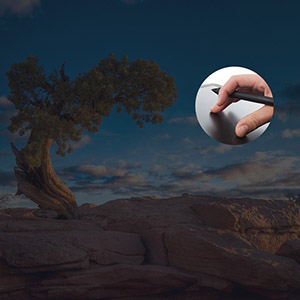|
How to supercharge the Adobe brush engine with Wacom pressure sensitivity
The Adobe Brush Engine in Photoshop can be an amazing tool. When you connect a Wacom pen tablet or creative pen display to your computer, Photoshop recognizes your use of the tablet and gives you access to a number of capabilities that were not available to you before. One of the most significant benefits is the recognition of pressure sensitivity in the Wacom pen. All tools that leverage the Brush Engine can take advantage of pressure sensitivity.
 Wacom pen tablet benefits in Photoshop Wacom pen tablet benefits in Photoshop
Wacom's pressure-sensitive pens are recognized in the two dozen or more tools and brushes in Photoshop. From the Clone Stamp and Healing Brush, to Layer Masks and Adjustment Layers, youcan dynamically adjust color temperature exposure, tone, contrast, and most other features, all by how lightly or firmly you press your pen to the tablet. Your creative edits and enhancements will look more natural and organic using a pressure-sensitive Wacom pen.
Check out this checklist of the most popular tasks in Photoshop that benefit from the pressure-sensitive pen:
- Retouching with the Clone Stamp tool: This tool takes advantage of pressure sensitivity in a way that is ideal for subtleness of element removal, for a natural, professional effect.
- Improve brush work: Using the Brush tool and a soft edge brush, use pressure sensitivity to subtly improve skin tones, brighten eyes, and soften features.
- Creating selections: Some of the toughest things to master in Photoshop, the selection tools are made more precise as you paint your selection on the image.
- Compositing tasks: Natural and intuitive masking helps you create composite images that look natural and intentional, thanks to the pressure-sensitive brush and Layer Mask feature.
- Targeted adjustment layers: Make brush-on adjustments to an image and control the opacity of the
- effect based on how hard you press the pen to the tablet.

Wacom brings out the best in Photoshop's multi-touch Interface
Recently, Adobe introduced multi-touch support in Photoshop, similar to what we already enjoy in Adobe® Illustrator®. Multi-touch gestures speed up your workflow by enabling you to get to the details that you wish to edit faster and make the necessary changes more intuitively. With integrated multi-touch capabilities, Wacom's Intuos Pro and Cintiq line enable you to pinch, zoom, and rotate with ease, while brushing on enhancements with the Wacom pen.
Programmable ExpressKeys
The programmable ExpressKeys on your Intuos Pro pen tablet are likely a nice surprise and a productivity tool you may not have expected. So many functions can be controlled by using the
ExpressKeys on a tablet. These can be as simple as selecting the brush panel, or they can be programmed to do complex tasks, such as creating an inverted layer mask. If you can do it with keyboard shortcuts, it can be programmed as an ExpressKey action.Not only that, but you can have a whole set of ExpressKeys settings for each application that you run on your computer. The tablet knows which application you are using and changes the ExpressKeys accordingly.
 Adobe Lightroom takes note of pressure sensitivity Adobe Lightroom takes note of pressure sensitivity
Lightroom serves a crucial image management and editing role in a Photographer's workflow. Taking a cue from its customers, Adobe introduced pressure-sensitive pen features in the adjustment brush to help you do some of your image editing in Lightroom.
Similar to Photoshop, when you use a Wacom pen tablet in Lightroom, you gain the ability to more precisely and subtly enhance your images, so that your retouching looks natural. Examples include brightening the eyes, adding color to the pupils, or following the natural contours in your photo to add definition to cheeks and lips.
|

